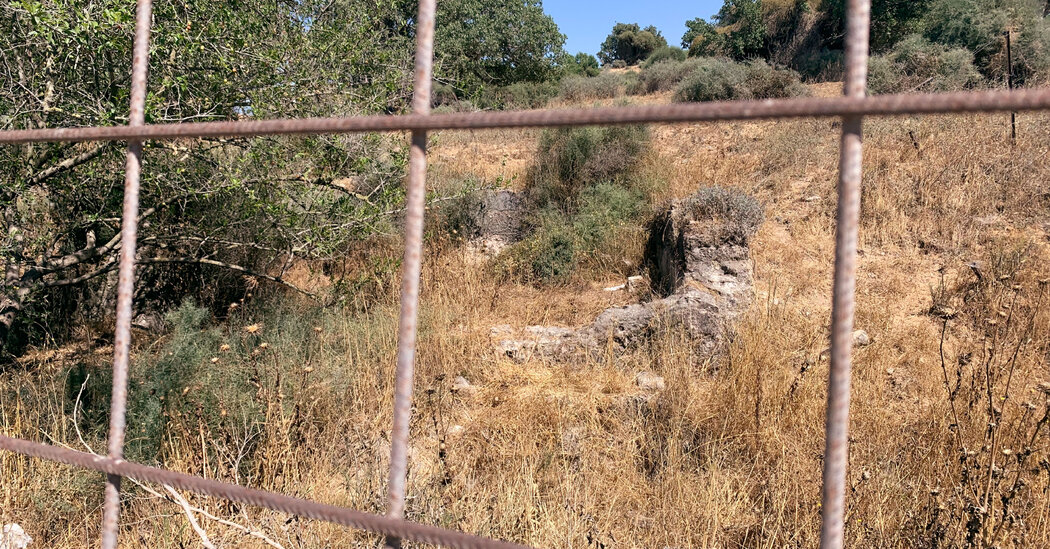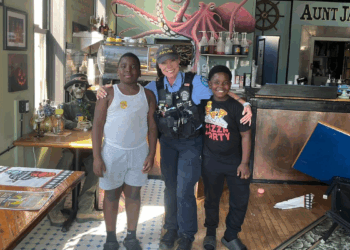My mother-in-law, Fatima, can’t read or write. She speaks only colloquial Palestinian Arabic and stops walking after just a few steps because of debilitating arthritis in her knees. And yet, thanks to recurrent displacement by the Israeli military, she is now, in her 80s, forced to travel the world. Following a stay in Cairo, she’s currently in Riyadh, Saudi Arabia, on a visa due to expire shortly. She’s casting about for where to go next.
Fatima was born in a village called Isdud, close to what is now the southern Israeli city of Ashdod. She was about 5 years old when the Israeli military closed in on the village in October 1948. My mother-in-law fled with her parents and thousands of neighbors to Gaza. Shortly after occupying Isdud, the Israeli military expelled its remaining residents and demolished the village.
After the war, my future mother-in-law became one of more than 700,000 Palestinian refugees prevented from returning home as part of the nascent state’s goal to maintain a Jewish majority in as much of historic Palestine as possible.
The Israeli government is now advancing plans to forcibly displace more Palestinians, mostly in Gaza but also in the West Bank. In early July, Defense Minister Israel Katz said he ordered the military to prepare a “humanitarian city” on the ruins of Gaza’s southern city of Rafah, which the Israeli military has almost entirely destroyed.
Everyone in Gaza would eventually be concentrated there, he explained. They would not be allowed to return to their homes in other parts of the strip.
Mr. Katz said international humanitarian organizations — as yet unnamed — would be charged with managing the area. The Israeli prime minister, Benjamin Netanyahu, has also said he’s working with the United States to find third countries to resettle displaced Gaza residents.
The Israeli military has already displaced a vast majority of Gaza’s more than two million residents. Still, some Israeli politicians, among them a former defense minister from Mr. Netanyahu’s own Likud party, have balked at Israeli authorities’ unabashed embrace of what is hard to describe as anything other than ethnic cleansing.
The right of return to one’s home country is enshrined in both U.N. General Assembly Resolution 194, adopted in December 1948, and the International Covenant on Civil and Political Rights, which protects all people’s rights to return to their own territory, even if sovereignty has changed hands. The right applies to a refugee’s descendants, like my mother-in-law’s four children, 19 grandchildren and 24 great-grandchildren, if they have maintained enough links with the area that it would be considered their “own country.”
Those within and outside Israel who oppose forcing Palestinians out of Gaza today should also oppose ongoing forced displacement of Palestinian refugees like my mother-in-law from their homes in what is now Israel — and support their return.
I’m an Israeli American Jew. I have lived in Israel and the West Bank since 1997. In the American Zionist communities where I grew up, writers, rabbis and school principals warned that respecting the right of return for what is now an estimated six million Palestinian refugees worldwide would mean the end of Israel as a majority Jewish state.
That’s probably true. Israel may soon lose its Jewish majority anyway. Since 1967, the Israeli government has controlled historic Palestine, from the Jordan River to the Mediterranean Sea, an area now home to about 7.4 million Jews and 7.4 million Palestinians.
When I was a child, my elders taught me that Jews could not be safe unless we were in control of Israel. It took me years to realize that this is logic used to justify a zero-sum game, in which Israeli authorities commit abuses against Palestinians in the name of preventing Palestinians from committing abuses against Israeli Jews.
That is the same bloody reasoning behind the Israeli government’s use of Hamas’s Oct. 7, 2023 crimes against Israeli civilians to justify crimes continuing against Palestinian civilians. Israeli acts of what I — and many others — believe to be forced displacement, starvation as a weapon of war and genocide in Gaza are shocking but not surprising, because maintaining Jewish demographic superiority requires the ongoing oppression of Palestinians.
My mother-in-law’s forced displacement did not end in 1948. She spent the rest of her childhood in a refugee camp in the Gaza Strip and never resumed the education she had begun in Isdud. Instead, around age 13, Fatima was married, a child bride, to a fellow refugee. Her husband fled Gaza, without her, when Israel captured the strip in 1967. A few years later, as a single mother of five, she was displaced a second time: Israeli military bulldozers demolished her home, presumably to make it easier for tanks to move through the refugee camp.
Her family built a new house on land they received from the Palestinian Authority in the 1990s. Then, on Oct. 13, 2023, the Israeli military ordered her and everyone else in northern Gaza to leave. She sheltered in Rafah for months, until the Israeli military arrived. The family was forced to flee once more.
Unwilling to leave her behind, and knowing her lack of mobility would have endangered everyone, Fatima’s children pushed her to join a U.S. convoy leaving Gaza for Egypt — a privilege made possible because her second-youngest son, my spouse, is an American citizen. The moment she arrived in Egypt, Fatima wanted to return to Gaza. She’s 82 years old. She’s not afraid to die; she’s afraid of spending the rest of her life separated from her family now scattered throughout Gaza.
Her three children in Gaza are lucky enough to have returned to one of the few homes in their refugee camp that the Israeli military did not destroy, but they face a daily risk of new evacuation orders, or worse. Twenty-four of her grandchildren and great-grandchildren are still sheltering across the strip — some are under tarpaulins or at relatives’ homes, others are in a school, an office and rented rooms. Most no longer have homes to return to.
Almost 77 years have passed since my mother-in-law’s first expulsion. It’s difficult to draw a legal or moral distinction between contemporary plans to empty Gaza of Palestinians and denying the right of 1948 Palestinian refugees to return.
Given the staggering physical, social and economic destruction that the Israeli military has wreaked on Gaza, the obstruction of humanitarian aid and the likelihood of continued hostilities even if the parties reach a cease-fire, many Palestinians in Gaza will want to relocate away from the strip, at least temporarily. But they have a legal right to return to Gaza, now, or in the future. And under international law, the 1.6 million 1948 refugees and their descendants in Gaza also have a right to resettle on the land taken from them and their families three-quarters of a century ago, and to benefit from the housing, infrastructure, services, schools and universities in the land that is now Israel that they have been unlawfully denied.
It can be difficult to imagine Palestinian refugees returning after so many years and so much violence. But their return would be an opportunity to transform the Israeli system of governance from one supporting an ethnonationalist state aimed at maintaining Israeli Jewish dominance over Palestinians to a rights-respecting democracy that protects the equality, freedom and security of all residents.
My mother-in-law can’t stay in Saudi Arabia much longer, but, as Israel isn’t allowing travel to Gaza, nor can she return to her beloved seaside home. For now, she doesn’t know where she will go.
I recently visited Fatima’s childhood home, Isdud, on Israel’s southern coast. What had been the village center now abuts a cement factory and serves as grazing land for cows. I found the unmarked ruins of a mosque, its stunning vaulted arches partially intact, and the boys’ and girls’ schools, which were piles of rubble. I took photographs and a small stone from the mosque, tying a ribbon around the latter as a gift to my stateless, homeless mother-in-law.
Sari Bashi is a former program director at Human Rights Watch and the author of the forthcoming book “Upside-Down Love.”
The Times is committed to publishing a diversity of letters to the editor. We’d like to hear what you think about this or any of our articles. Here are some tips. And here’s our email: [email protected].
Follow the New York Times Opinion section on Facebook, Instagram, TikTok, Bluesky, WhatsApp and Threads.
The post What We Talk About When We Talk About the Right of Return appeared first on New York Times.




